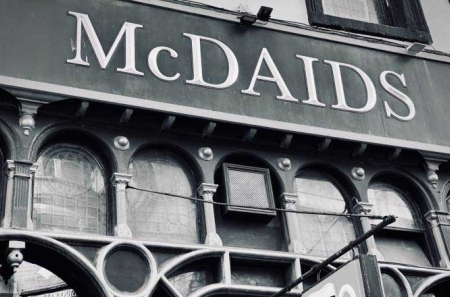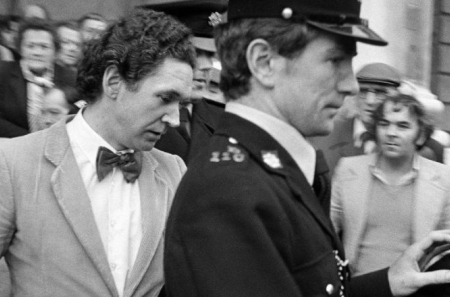
Modern Ireland in 100 Artworks: Bligeard Sráide by Michael Davitt
03 March 2016This week’s Modern Ireland in 100 Artworks is Bligeard Sraide published in 1983 by Michael Davitt, which established Davitt as one of the most innovative poets in the Irish language.
Born in Cork in 1950, Davitt worked as a producer and director for RTÉ, and was the founder and editor of Innti, an influential poetry journal in the Irish language. In 1994, he received the Butler Award for Literature from the Irish-American Cultural Institute. He passed away suddenly in 2005.
Read the Dictionary of Irish Biography entry on Davitt, by Dr James Quinn, below:
Davitt, Michael (1950–2005), poet, was born Joseph Michael Davitt on 20 April 1950 in Mayfield, Cork city, the third child of four children (three girls and a boy) of Joe Davitt, a bus driver and native of Mallow, Co. Cork, and his wife Hilda (néae Parker), originally from Stoke-on-Trent (they met when Joe was working in England). He attended St Patrick's national school, Gardiner's Hill, and the North Monastery CBS, Cork, where Brother Seán E. Ó Cearbhaill, himself a poet, inspired his love of poetry and the Irish language. While still at school he published some poems in Agus in 1966. He took a BA degree in Celtic Studies at UCC, where he was influenced by figures such as Professor Seán Ó Tuama, professor of Irish literature at UCC (1968–90), Seán Ó Ríordáin (qv), the poet and essayist who gave occasional lectures at UCC, and Seán Ó Riada (qv), then lecturing in music at the college and with a pervasive influence on all forms of Irish culture. Davitt immersed himself in the work of Munster poets such as Aogán Ó Rathaille (qv), Piaras Feiritéar (qv), and Brian Merriman (qv), and gained fluency in Irish through trips to the Gaeltacht regions of Muskerry and Corca Dhuibhne. The people, heritage, and language of the Corca Dhuibhne Gaeltacht in particular had a great influence on his life and work, and during 1970–71 he took part in the campaign against the closure of the local school at Dhún Chaoin, marching from Dhún Chaoin to the Department of Education in Dublin.
In 1970 he published some poetry in Comhar and in March of that year he founded and edited Innti, a new Irish-language poetry journal. Innti promoted the work of a new generation of Irish-language poets, such as Nuala Ní Dhomnaill, Liam Ó Muirthile, and Gabriel Rosenstock, whose work like Davitt's challenged traditional forms and themes and sought to distance the Irish language from culturally conservative and narrowly nationalist ends. It tapped into a great well of creativity and enthusiasm for Irish in UCC and helped to create a supportive environment that used the language to address contemporary concerns. With their willingness to experiment and awareness of international popular culture, the Innti poets formed a highly influential movement that invigorated the writing of poetry in Irish and fired the imagination of many Irish enthusiasts.
After graduating from UCC Davitt moved to Dublin where he worked as an Irish-language teacher and as an organiser with Gael Linn, promoting Irish cultural activities such as festivals, drama, and music, most notably the Gael Linn Slogadh Youth Festival during the mid 1970s. On 26 July 1975 he married Máire Nic Fhinn, a native speaker of Irish from Tourmakeady, Co. Mayo; they had a son and two daughters. He worked for RTÉ television as a presenter with the programme Léargas (1985–8) and was producer–director of the RTÉ books programme Undercover. He brought his enthusiasm for poetry and song to television, and produced and directed the documentaries Joe Heaney: sing the dark away (1996), on the sean-nós singer Seosamh Ó hÉanaí (qv), and John Montague: rough fields (1998).
In 1981 he published the collection Gleann ar ghleann followed closely by Bligeard Sráide (1983), which brought his work to a wider audience and established him as one of the most exciting and innovative poets in the Irish language. His other collections include Galar gan náire (1989), An tost a scagadh (1993), Scuais (1998), Fardoras (2003), Dánta 1966–1998 (2004), and Seimeing soir (2004).
His poetry was eclectic in its influences and wide-ranging in its subject matter, with a vernacular edge and contemporary vision that defied the notion that poetry written in Irish was insular and dated. It veered between the personal and the political, and between modernity and tradition in an attempt to define meaning and identity in a fluid uncertain world. Davitt absorbed much of the irreverence and anti-authoritarianism of 1960s counter-culture but was never a naïve idealist. He believed that despite its marginalisation the Irish language could retain its vitality and creative power and was a pioneering figure in writing a poetry in which the irreverence and energy of the Beat poets and the surreal wordplay of Bob Dylan were blended with the spirit of traditional Munster Irish verse. A keen guitarist, Davitt loved to play the songs of Bob Dylan, and sought to capture something of Dylan's linguistic virtuosity in his poetry. The title of his first collection Gleann ar ghleann was intended as a tribute to Dylan's Blonde on blonde album and a poem such as '(Positively) Sráid Fhearchair' (1983) took much of its inspiration from Dylan.
His early collections were noted for poems such as 'Do Bhobby Sands an lá sular éag' ('For Bobby Sands on the day before he died') (1981) and 'Ó mo bheirt Phailistíneach' ('O my two Palestinians') (1983), which were powerful responses to topical events, but he achieved perhaps his greatest success with more personal works, notably with the understated intimacy of 'An scáthán' ('The mirror') (1983), a moving meditation on fatherhood and mortality written as an elegy for his father. Some of his best poems were pen pictures of native speakers he knew, such as 'I gcuimhne ar Lís Ceárnaighe, Blascaodach' ('In memory of Elizabeth Kearney, Blasketislander') (1981) and 'Dán do Sheosamh Ó hÉanaí' ('Poem for Joseph Heaney') (1987), in which he displayed an acute ability to capture revealing details of character and personality. As in all his best work, such poems combine considerable technical skill with humanity and awareness. Seán Ó Tuama credited him with being one of the most influential Irish poets of the 1970s, pointing the way to a form of poetry that was both playful and engaged, and acting as an inspiration to many of the young poets then learning their craft. Louis de Paor noted that his work is distinguished by 'a sense of rupture with received structures of language and traditional patterns of imagery. As in the work of Seán Ó Ríordáin, there is an ongoing argument with the Irish language itself.' He attempted to reconcile a deference towards tradition with a 'determination to undo such links with traditional usages as might constrain his own contemporary imagination, to sully the essential purity of the language, as imagined by revivalist puritans and cultural conservatives, with the liberating blasphemy of new coinages stolen from English and elsewhere' (Freacnairc mhearcair, xi).
Davitt was also a perceptive literary critic and contributed a foreword to a 1993 edition of the selected poetry of Patrick Pearse (qv) in which he described Pearse as a figure torn between patriotic duty and self-doubt who used poetry to reconcile his inner conflicts. He co-edited the trilingual anthology Sruth na Maoile: modern Gaelic poetry from Scotland and Ireland (1994), and published two major collections of his own poetry in dual-language editions: Selected poems/Rogha dánta (1987) and Freacnairc mhearcair: rogha dánta 1970–1998/The oomp of quicksilver: selected poems (2000). These English translations of his work managed to capture much of his sharp wit and verbal experimentation and brought his work to an even wider audience. Among his translators were fellow poets such as Brendan Kennelly, Paul Muldoon, Gabriel Rosenstock, Seán Ó Tuama, Michael Hartnett (qv), Dermot Bolger, and John Montague, although Davitt himself was an assured translator of his own verse. His work was also translated into French, German, Spanish, Italian, Russian, Hebrew, Arabic and Japanese. Davitt was a sociable and witty man, whose humour cloaked a rather bleak view of the world; his accessible and amusing poetry lent itself well to public reading, and he gave poetry readings throughout Ireland, often accompanied by his friend the musician Tony McMahon.
In 1994 he won the Butler Award for Literature from the Irish American Cultural Institute. He was a member of Aosdána, and won the Oireachtas Prize for his collection Fardoras. Separated from his wife, he lived with his partner Moira McSweeney, an artist, for periods in Bray, Co. Wicklow, and Athy, Co. Kildare. They spent much of their time travelling between France and Ireland and for some years devoted themselves to converting an old bakery in Gascony into a home. The influence of French culture and language was particularly noticeable onSeimeing soir (2004), Davitt's final collection of poetry. Having decided to return to Ireland to settle in Co. Sligo in 2005, he died unexpectedly on 19 June 2005 while out walking in Sligo and was cremated at Newlands Cross Crematorium in Dublin.
Inniu, 9 Feabhra 1973; Comhar (Nollaig 1984; Iúil 2005); Kathleen McCracken, 'Act of defiance: the poetry of Michael Davitt', Antioch Review, xlviii, no. 3 (1990), 372–80; Padraic Pearse, Selected poems (1993); Fortnight(Dec. 1994), 46; Gearóidín Uí Nia (ed.), Eolaire chló Iar-Chonnachta de scríbhneoirí Gaeilge: Who's who in Irish writing (1998); Michael Davitt, Freacnairc mhearcair (2000), ed. Louis de Paor; Stiofán Ó Cadhla, 'Middle-class flu and the hybrid vernacular', Irish Review, xxvii (2001), 193–6; Ir. Times, 4 Sept. 2004; 21, 22, 25 June 2005;Feasta (Iúil 2005); Siobhán Campbell and Gabriel Rosenstock, 'Michael Davitt (1950–2005)', Poetry Ireland(July/Aug. 2005); Beathaisnéisí Gaeilge, www.ainm.ie (accessed May 2012)
A new entry, added to the DIB online, June 2012
Catch up on the entire Modern Ireland in 100 Artworks series.



